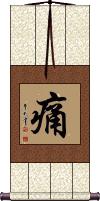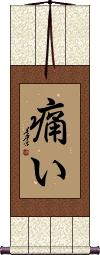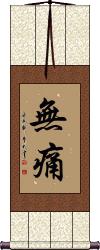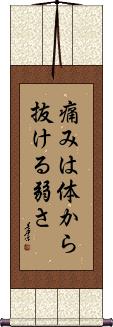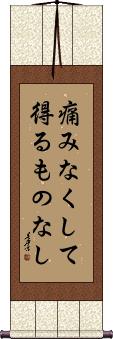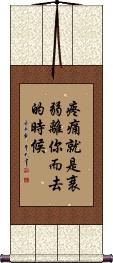Many custom options...
And formats...

痛 in Chinese / Japanese...
Buy an 痛 calligraphy wall scroll here!
Personalize your custom “痛” project by clicking the button next to your favorite “痛” title below...
Pain
ache / sorrow
痛 means pain in Chinese and old Korean Hanja. It also means pain/hurt/bruise in Japanese but is seldom seen as a single Kanji (usually, at least a Hiragana is added to make the word “itai” which is what a Japanese person will scream when they are in pain).
Depending on the context, this word can mean hurt, ache, sorrow, or refer to damage to a human body. As a single character, the possible meanings are very open - so you can decide what it means to you, as long as the general meaning is still “painful.”
Ouch!
Painless
無痛 is the Chinese, Japanese Kanji, and old Korean Hanja for painless or without pain.
無痛 is not a common title for a wall scroll, so select this only if it has a deep personal meaning to you.
No Pain No Gain
Literally: No Pain, No Strength
Pain is Weakness Leaving the Body
痛みは体から抜ける弱さ is how to write “pain is weakness leaving the body” in Japanese.
I remember this being shouted a lot during U.S. Marine Corps boot camp.
Note: Because this selection contains some special Japanese Hiragana characters, it should be written by a Japanese calligrapher.
No Pain No Gain
痛みなくして得るものなし is a Japanese phrase that means “no pain, no gain.”
This suggests that with pain, a gain must follow.
The pain Kanji here can also be translated as sorrow or suffering. The gain can also mean profit, advantage, or benefit. In the Japanese Buddhist context, that gain Kanji can mean rebirth in paradise, entering nirvana.
The character breakdown:
痛みなく (itami naku) pain; ache; sore; grief; distress. The naku part adds the meaning of “a lot of” or “extended”
して (shite) and then. (indicates a causative expression; acts as a connective particle)
得る (eru) to get; to acquire; to obtain; to procure; to earn; to win; to gain; to secure; to attain.
もの (mono) conjunctive particle indicating a cause or reason.
なし (nashi) none of; -less; without; no.
Note: Because this selection contains some special Japanese Hiragana characters, it should be written by a Japanese calligrapher.
Pain is Weakness Leaving the Body
I remember this being shouted a lot during U.S. Marine Corps boot camp. 疼痛就是衰弱離你而去的時候 is how to write that phrase in Chinese. At least, this is as close as we could compose/translate it, and hold the full original meaning and connotations.
The version shown here is really, “Pain is weakness leaving your body.” Although it's said in English both ways (the or your), it works better in Chinese with “your.”
Not the results for 痛 that you were looking for?
Below are some entries from our dictionary that may match your 痛 search...
| Characters If shown, 2nd row is Simp. Chinese |
Pronunciation Romanization |
Simple Dictionary Definition |
痛 see styles |
tòng tong4 t`ung tung tsuu / tsu つう |
More info & calligraphy: Pain(n-suf,n) pain; ache; -algia; (personal name) Ikarimoto pain |
無痛 无痛 see styles |
wú tòng wu2 tong4 wu t`ung wu tung mutsuu / mutsu むつう |
More info & calligraphy: Painless(noun - becomes adjective with の) painless |
痛い see styles |
itai いたい |
More info & calligraphy: Ouch! |
五痛 see styles |
wǔ tòng wu3 tong4 wu t`ung wu tung gotsū |
idem 五燒. |
作痛 see styles |
zuò tòng zuo4 tong4 tso t`ung tso tung |
to ache |
傷痛 伤痛 see styles |
shāng tòng shang1 tong4 shang t`ung shang tung |
pain (from wound); sorrow |
切痛 see styles |
qiē tòng qie1 tong4 ch`ieh t`ung chieh tung |
sharp pain |
刺痛 see styles |
cì tòng ci4 tong4 tz`u t`ung tzu tung |
to tingle; to sting; to have a sudden sharp pain; (fig.) to hurt deeply; tingle; prick; sting; stab of pain |
創痛 创痛 see styles |
chuāng tòng chuang1 tong4 ch`uang t`ung chuang tung |
pain from a wound |
劇痛 剧痛 see styles |
jù tòng ju4 tong4 chü t`ung chü tung gekitsuu / gekitsu げきつう |
acute pain; sharp pain; twinge; stab; pang pain (intense, sharp, violent) |
哀痛 see styles |
āi tòng ai1 tong4 ai t`ung ai tung aitsuu / aitsu あいつう |
to grieve; to mourn; deep sorrow; grief (noun/participle) grieving; mourning; being very sad |
圧痛 see styles |
attsuu / attsu あっつう |
oppressive pain; tenderness; pressure pain |
壓痛 压痛 see styles |
yā tòng ya1 tong4 ya t`ung ya tung |
(medicine) tenderness; pain experienced when touched or palpated |
心痛 see styles |
xīn tòng xin1 tong4 hsin t`ung hsin tung shintsuu / shintsu しんつう |
to feel distressed about something; heartache; cardiac pain (n,vs,vi,adj-no) worry; mental agony; heartache |
忍痛 see styles |
rěn tòng ren3 tong4 jen t`ung jen tung nintsū |
to suffer; fig. reluctantly to bear pain |
悲痛 see styles |
bēi tòng bei1 tong4 pei t`ung pei tung hitsuu / hitsu ひつう |
grieved; sorrowful (n,adj-na,adj-no) grief; sorrow; extreme sadness; heartbreak |
惱痛 恼痛 see styles |
nǎo tòng nao3 tong4 nao t`ung nao tung nōtsū |
suffering |
慘痛 惨痛 see styles |
cǎn tòng can3 tong4 ts`an t`ung tsan tung |
bitter; painful; deeply distressed |
抽痛 see styles |
chōu tòng chou1 tong4 ch`ou t`ung chou tung |
to throb with pain; throbbing pain; twang; pang; CL:陣|阵[zhen4] |
杖痛 see styles |
zhàng tòng zhang4 tong4 chang t`ung chang tung jōtsū |
pain caused by being beaten with a staff |
極痛 极痛 see styles |
jí tòng ji2 tong4 chi t`ung chi tung gokutsū |
hurtful |
止痛 see styles |
zhǐ tòng zhi3 tong4 chih t`ung chih tung |
to relieve pain; to stop pain; analgesic |
歯痛 see styles |
shitsuu; haita / shitsu; haita しつう; はいた |
(noun - becomes adjective with の) toothache |
沈痛 see styles |
chintsuu / chintsu ちんつう |
(adjectival noun) grave; sad; mournful; sorrowful; pensive |
沉痛 see styles |
chén tòng chen2 tong4 ch`en t`ung chen tung |
grief; remorse; deep in sorrow; bitter (anguish); profound (condolences) |
激痛 see styles |
gekitsuu / gekitsu げきつう |
pain (intense, sharp, violent) |
灼痛 see styles |
zhuó tòng zhuo2 tong4 cho t`ung cho tung |
burn (i.e. wound); burning pain |
牙痛 see styles |
yá tòng ya2 tong4 ya t`ung ya tung |
toothache |
産痛 see styles |
santsuu / santsu さんつう |
labor pains; labour pains |
疝痛 see styles |
sentsuu / sentsu せんつう |
colic; celialgia; enteralgia; gripes |
Click here for more 痛 results from our dictionary
The following table may be helpful for those studying Chinese or Japanese...
| Title | Characters | Romaji (Romanized Japanese) | Various forms of Romanized Chinese | |
| Pain | 痛 | tsuu / ita / tsu / ita | tòng / tong4 / tong | t`ung / tung |
| Ouch! | 痛い | itai | ||
| Painless | 無痛 | mutsuu / mutsu | wú tòng / wu2 tong4 / wu tong / wutong | wu t`ung / wutung / wu tung |
| No Pain No Gain | 不痛不強 不痛不强 | bú tòng bù qiáng bu2 tong4 bu4 qiang2 bu tong bu qiang butongbuqiang | pu t`ung pu ch`iang putungpuchiang pu tung pu chiang |
|
| Pain is Weakness Leaving the Body | 痛みは體から抜ける弱さ 痛みは体から抜ける弱さ | itami wa karada kara nukeru yowasa | ||
| No Pain No Gain | 痛みなくして得るものなし | itami naku shite erumono wa nashi | ||
| Pain is Weakness Leaving the Body | 疼痛就是衰弱離你而去的時候 疼痛就是衰弱离你而去的时候 | téng tòng jiù shì shuāi ruò lí nǐ ér qù de shí hòu teng2 tong4 jiu4 shi4 shuai1 ruo4 li2 ni3 er2 qu4 de shi2 hou4 teng tong jiu shi shuai ruo li ni er qu de shi hou | t`eng t`ung chiu shih shuai jo li ni erh ch`ü te shih hou teng tung chiu shih shuai jo li ni erh chü te shih hou |
|
| In some entries above you will see that characters have different versions above and below a line. In these cases, the characters above the line are Traditional Chinese, while the ones below are Simplified Chinese. | ||||
Successful Chinese Character and Japanese Kanji calligraphy searches within the last few hours...
